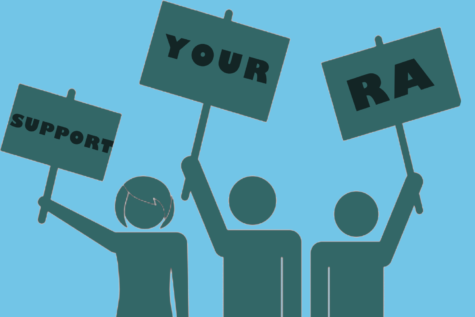OPINION | Addressing mistreatment of Tulane’s Residential Advisors

Residential Advisors, referred to as RAs, are an essential part of Tulane University’s campus life. The university contracts RAs to supervise dorm residents. However, the university does not offer these students the proper compensation, training and care they deserve. The culture around RA employment benefits Housing and Residential Life, rather than the students’ needs.
Many RAs do not want to be working the job, but the benefits are too good for some to turn down. Becoming an RA ensures one’s housing and meal plan. These benefits draw in many financially struggling students who have few other options. By offering essentials as compensation, the school targets vulnerable students as employees.
The provided housing and meal plans are not proper compensation for university RAs. HRL has reportedly not adjusted the meal plan aspect of RA compensation for inflation. Additionally, RAs are required to remain on campus for either spring or fall break. During these times, school dining is closed, leaving RAs with little access to food. As of now, the school provides approximately $800 Wavebuck$ to its RAs, which can barely cover the cost of food for students who depend on it. For comparison, the TU7 meal plan offers $1,000 Wavebuck$ to its students.
RAs receive little support from the school. They are expected to handle and diffuse extremely stressful situations and topics. An anonymous RA explained that their training included how to remove a knife from a student who wields it as a weapon, rather than to prioritize their own safety. They said, “I was not in a space that was going to care about me and … I was just a commodity to them.” Lack of support is not limited to dangerous situations, but also to traumatic events such as sexual assault, which they are reportedly not given crisis training for.
During emergencies, like Hurricane Ida, RAs operate with little information and no standard protocols. One RA said they were strongly urged to stay during Ida even though they did not feel safe. This RA reported that they stayed in fear of losing their job. During Ida, HRL expected RAs to account for whether their residents had evacuated, but did not give them tools to track students. Still, most students look to their RAs as leaders and expect them to know everything in emergency situations.
RAs are also required to resolve issues within their dorm. According to RAs interviewed, Tulane gives no counseling or support to their RAs, although they require them to help their residents in emotionally distressing situations. They also have zero access to crisis management training, leaving RAs to deal with mentally difficult experiences on their own.
Tulane claims to fully recognize its student employees, but RAs are not even considered student employees. Instead, they are “student leadership” positions. This reportedly excludes them from the benefits of actual employees.
The RAs interviewed mentioned that HRL offers little communication access for RAs. RAs must contact HRL heads through Residential Directors, which leads to an extreme lack of discourse of RAs’ wants and needs. Though the RDs are slated as the RAs’ access point to higher ups in HRL, they usually prove ineffective.
Many RAs were cautious to engage in interviews for this piece. HRL has a retaliatory past towards RAs who speak out about worker mistreatment. An anonymous RA revealed a message from their RD regarding contact with the press. In this message, the RD threatened dismissal if RAs were to speak to the press. While the RD later retracted this statement due to inaccuracy, this encounter suggests that HRL may take advantage of their employee’s vulnerability if authority figures spread false information.
Overall, Tulane and HRL need to make a more concerted effort to support their RAs and fully compensate them, as well as provide better support. As of now, Tulane is simply taking advantage of low-income students who have no other choice than to work in such situations.
Your donation will support the student journalists of Tulane University. Your contribution will allow us to purchase equipment and cover our annual website hosting costs.


